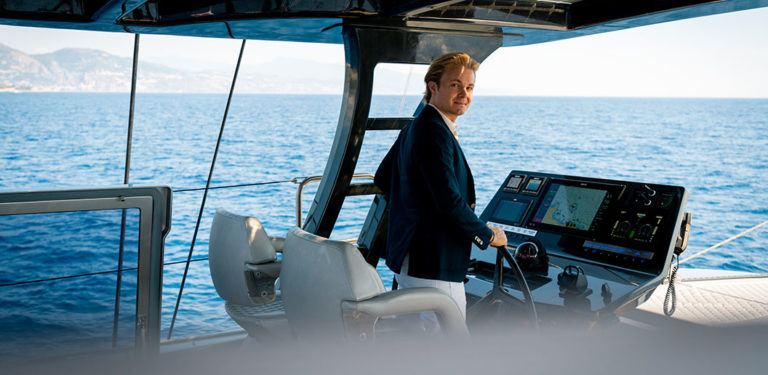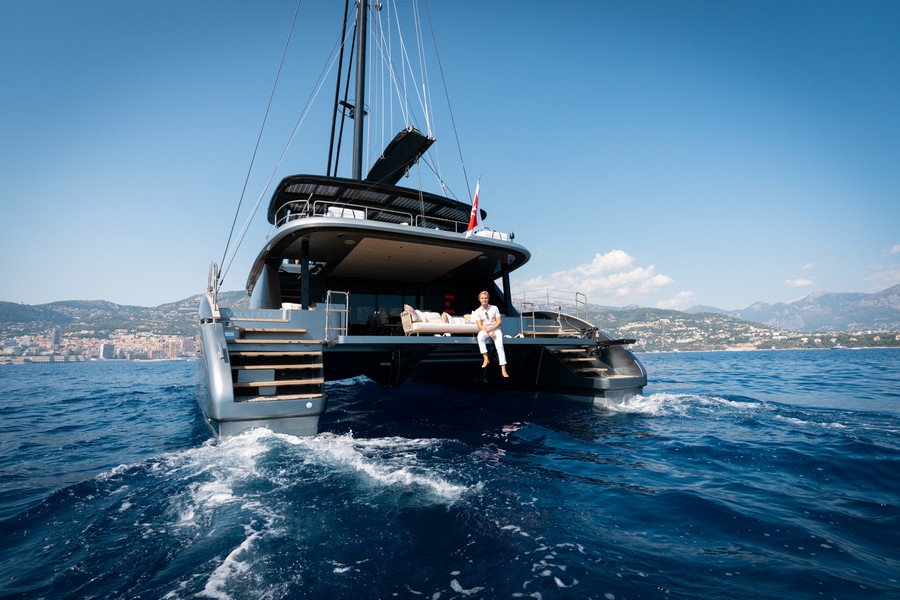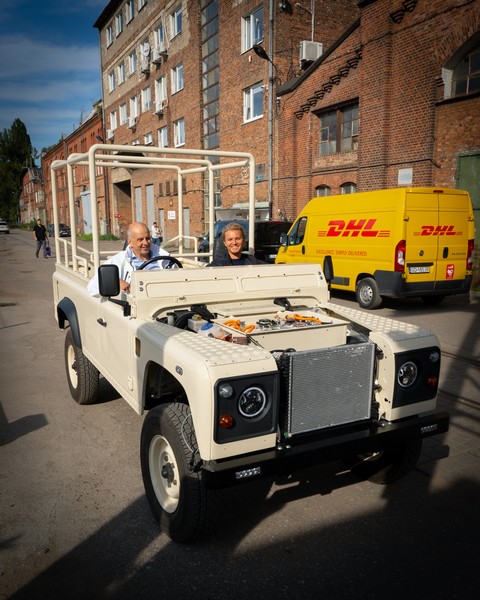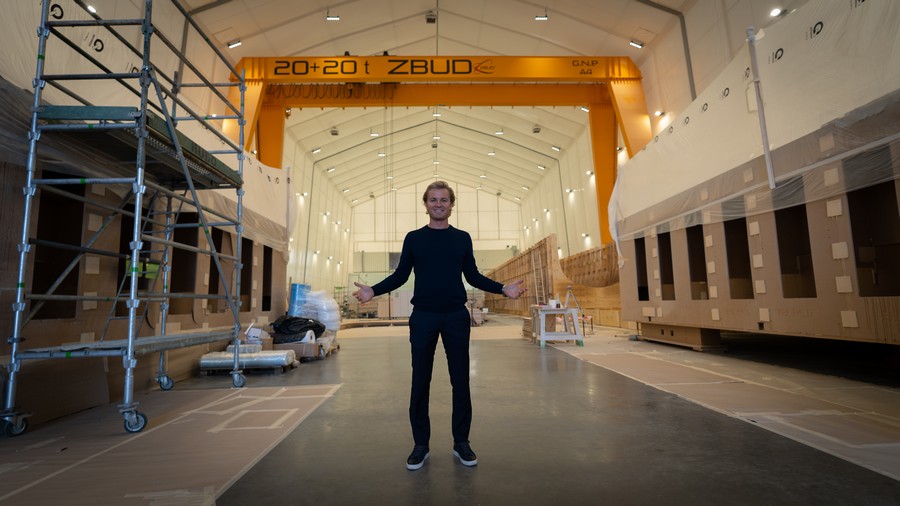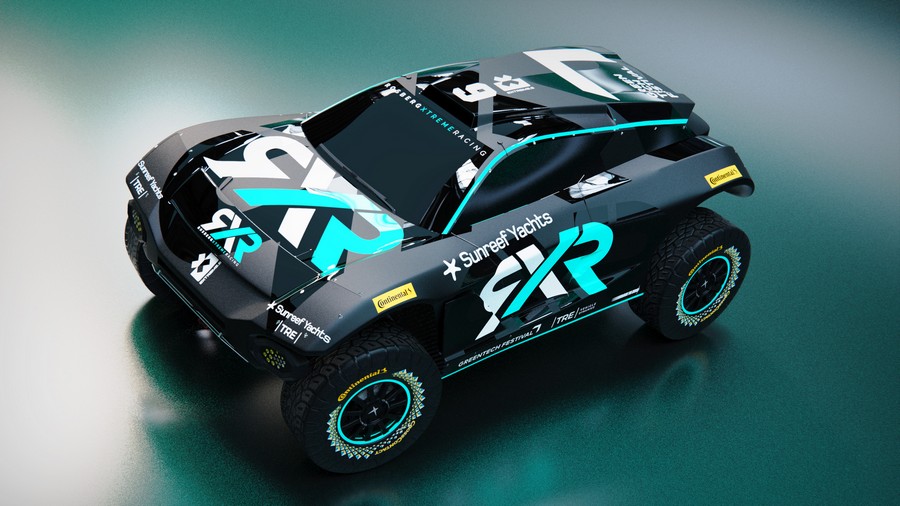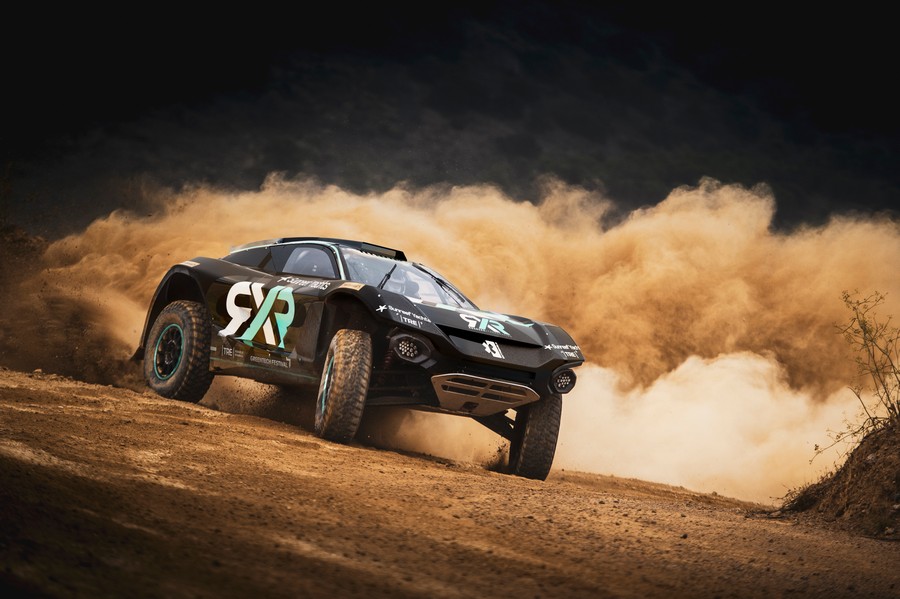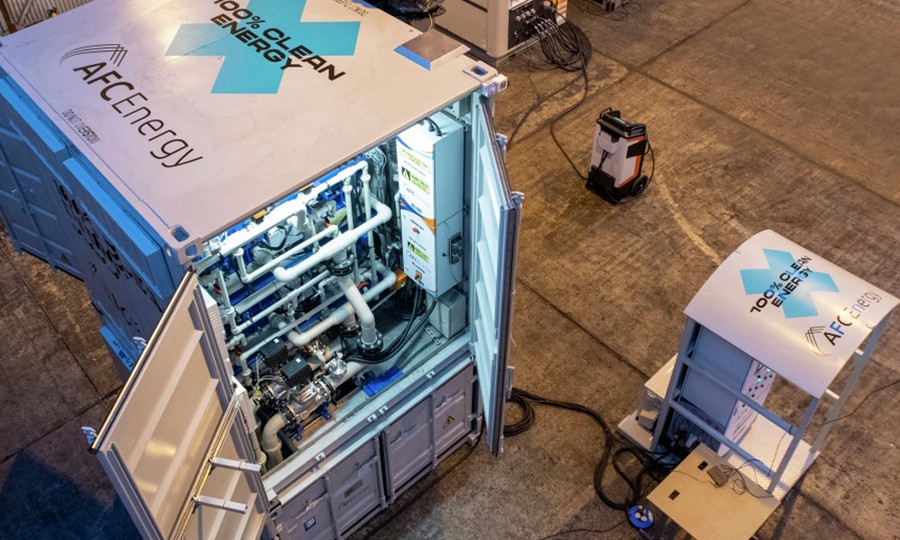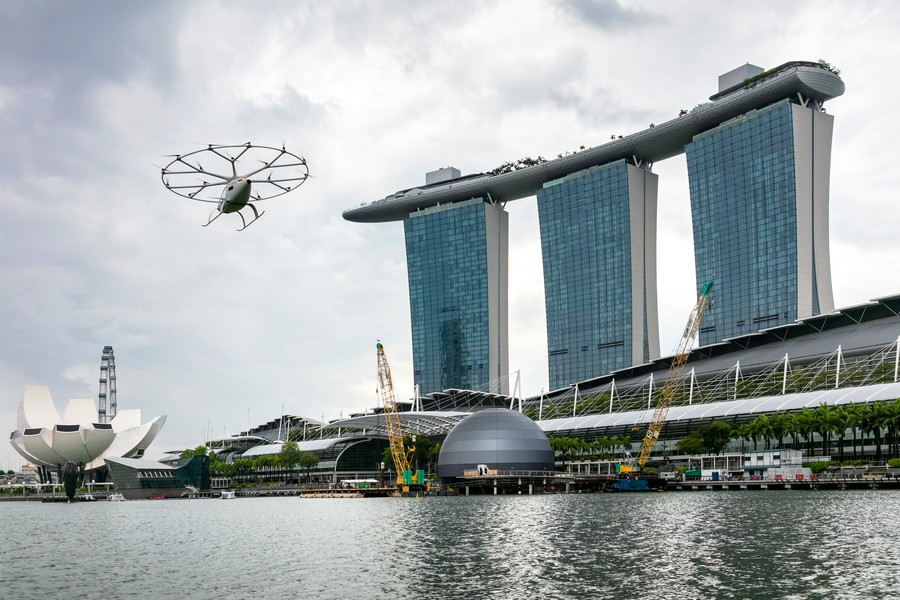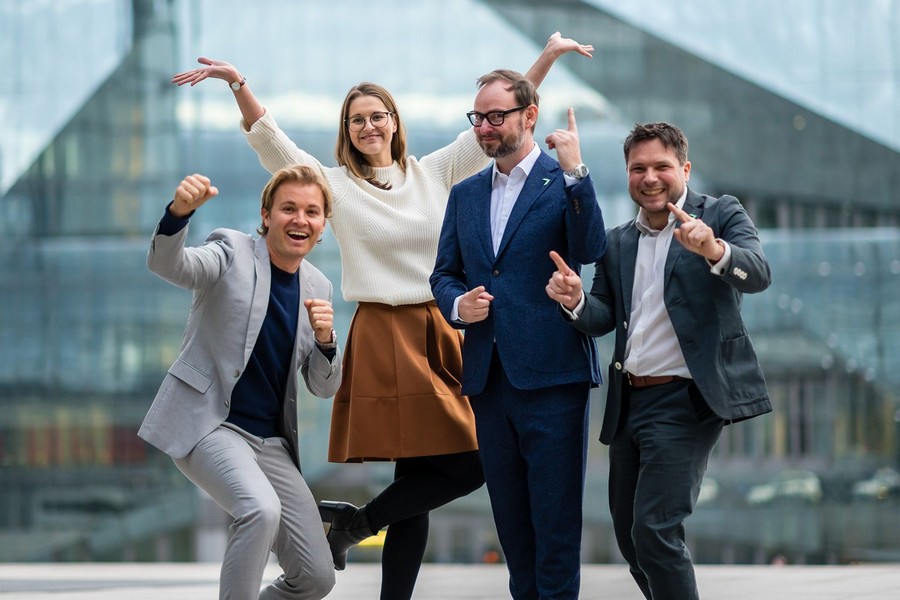Nico Rosberg moved into the yachting spotlight last year as the ambassador for Sunreef Yachts’ Eco range of solar-powered catamarans.
Meanwhile, the 2016 F1 champion turned sustainability entrepreneur also owns a team in the new Extreme E off-road series for electric SUVs, in which the use of hydrogen offers a window into the fuel’s potential use for yachts.
WORDS JOHN HIGGINSON PHOTOS SUNREEF YACHTS
Sunreef Yachts made global headlines in early June last year when tennis legend Rafa Nadal received his 80 Sunreef Power Great White at his home port in Mallorca. Soon after, on World Oceans Day on June 8, the Polish builder announced a tie-up with another sporting icon when it named Nico Rosberg as the Ambassador for its new Eco range of luxury solar-powered sailing and power catamarans.
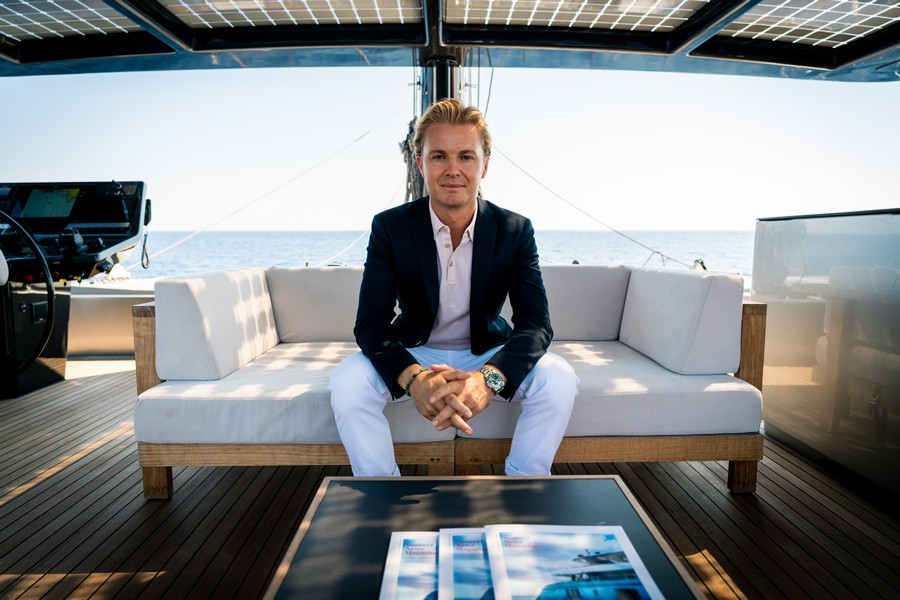
Rosberg is best-known for a high-profile Formula One career that included 23 wins in 11 years, including nine in 2016 when he won a gripping World Championship, pipping Mercedes teammate Lewis Hamilton after finishing runner-up to the Brit the previous two years.
However, just five days after securing the championship at the season ending race in Abu Dhabi, the Monaco-based German announced his surprise retirement from the sport at the age of 31.
Since then, Rosberg has established himself as a successful e-mobility and green tech entrepreneur and investor, leading to his ongoing partnership with Sunreef. However, despite a globe-trotting sporting career that overlapped with Nadal’s for many years, Rosberg never met the Spaniard until a chance encounter in the Balearic Islands late last year.
“It was funny,” he smiles. “I was in a bay in Formentera, south of Ibiza, and Rafa suddenly arrived on his new yacht, Great White. I had never met him before, but we both had the Sunreef connection, so I swam over to his boat.
“It was really nice. He said, ‘Oh, it’s so cool that you’re also in partnership with Sunreef for their Eco range. Let’s have a chat.’ He was super happy to have his boat, so we just sat on the back and had a nice conversation.”
The son of Keke Rosberg, the 1982 Formula One champion, Rosberg was born into racing and became a global superstar during seven years with Mercedes, partnering compatriot Michael Schumacher and Hamilton – F1’s two most successful drivers – for three and four years respectively.
Yet despite a sporting career based on power and speed, Rosberg prefers to sail when on the water and has enjoyed spending time testing a Sunreef 60 E from his base in Monaco, where he has lived for much of his life.
“I love sailing. The sheer beauty of it is just unbelievable. When I was on the Sunreef, letting the sails out, using the power of the wind and enjoying the silence just gives you this amazing way of enjoying nature,” says Rosberg, whose luxury brand partnerships also include Kempinski Hotels.
“But there’s a responsibility. I’ve been enjoying our oceans so much throughout my life because I’ve been so fortunate to be on boats, and anyone building yachts has a responsibility to take care of the oceans and that’s what Sunreef is doing so well. This is definitely the right path for luxury yachting.”
Rosberg’s partnership with Sunreef stemmed from his father introducing him to Francis Lapp, founder and President of Sunreef, passionate rally car driver and Formula One fanatic.
“Francis is a huge racing fan, so we met in the paddock and got talking. It only really kicked off when I realised how passionate about sustainability Francis and the Sunreef crew were, because that’s my path as an entrepreneur. I was like, wow, we have so many synergies, we should do something with this. The partnership with Sunreef Yachts totally fits into my mobility ecosphere.”
SUNREEF’S ECO PATH
Rosberg is impressed with what he has seen at the builder’s facility in Gdansk on Poland’s north coast, where Lapp’s background as an electrical engineer has ensured that Sunreef has always prioritised the most advanced technology in its luxury catamarans.
“Francis is an engineer at heart, so they have engineering excellence as one of their highest priorities. That’s why it’s fascinating what Sunreef is coming up with, to make luxury yachting sustainable, and why it’s a pleasure to work with them. In the factory, they have a whole innovation space where innovators are trying new technologies and making progress all the time.”
In just a few years, Rosberg has quickly got up to speed on a whole variety of sustainable technologies and was quick to recognize the brand’s cutting-edge work in combining electric propulsion with a remarkable solar-power system and super-light, high-performance batteries.
“It’s all really, really innovative and trailblazing. I love that they’re pushing boundaries. Their solar-powered solution is particularly innovative, how they’re covering the hull of the boats with tiny solar cells. They’re focused on reducing weight, using carbon a lot and introducing more sustainable materials,” he says.
“At the moment, they’re working on building future hulls with a basalt and linen material combination, which would be a huge step in sustainability. They’re really trying everything, using recycled teak instead of new teak and many other examples. It’s really awesome and very fascinating.”
As well as making yachts and boat operations more eco-friendly, Rosberg says it’s important that sustainability in yachting starts to make the move from niche and idealistic to mainstream, even ‘cool’. Although he’s involved with and surrounded by green tech pioneers, he does believe that sustainability in yachting is becoming more than good PR.
“I think what’s changing is that a yacht owner can impress people if their yacht is ultra-sustainable, because that’s just cool. Having petrol-burning black smoke coming out the back just doesn’t impress anyone,” he says.
“In the next couple of years, you’ll be able to impress with a yacht that’s super innovative in terms of sustainability, like Sunreef’s solar-panel solution, especially when you see the drive-train solution integrated into the yacht and maybe even wind power generators. That’s going to be the way to impress in future.
“People are more conscious of our environment and every yacht owner wants to impress with their boat, so I think that’s a strong power.”
Rosberg says the appeal of eco-friendly yachts and other vehicles is only going to increase with both future generations demanding the technology and the technology itself improving over time.
“If the owner’s kids are coming on board and the yacht’s blowing smoke out the back, they’re going to be like, ‘Hey, what are you doing?!’ All these different powers are coming into play and it’s becoming a big trend, which is amazing because we’re facing such a big threat to the environment.”
FORMULA E TO EXTREME E
Rosberg’s business portfolio includes being an investor and shareholder in Formula E, the global electric-car series that started with its first race in Beijing in September 2014 and whose venues in Asia have also included Putrajaya, Hong Kong and Sanya.
However, he has a more personal involvement in the brand-new Extreme E as the founder and CEO of Rosberg Xtreme Racing, one of 10 teams competing in the 2021 series featuring male-and-female duos racing electric SUVs off-road in remote locations.
Spanning four continents, the five-stop series is designed to highlight the impact of climate change and human activity on some of the world’s remote locations, while promoting sustainability and the adoption of electric vehicles to help protect the planet.
Covering a variety of environments, the schedule featured the Desert X Prix in Saudi Arabia (April 3-4), Ocean X Prix in Senegal (May 29-30), and the upcoming Arctic X Prix in Greenland (August 28-29), Amazon X Prix in Brazil (October 23-24) and Glacier X Prix in Argentina (December 11-12).
In late February, the RMS St Helena, Extreme E’s floating paddock and base, departed the UK for Saudi Arabia carrying the series’ freight and infrastructure, including race cars.
As well as Rosberg, high-profile team owners include Hamilton, the seven-time F1 world champion, and Jenson Button, the 2009 world champion who will be one of his team’s two drivers. Like Rosberg, Hamilton won’t be at the wheel, but his team’s drivers include Sebastien Loeb, the nine-time World Rally Championship winner.
Sunreef has come on board as a corporate partner of Rosberg Xtreme Racing, a natural sponsorship considering Lapp’s long history of rally driving including two editions of the Paris-Dakar Rally and last year’s Africa Eco Race, which Sunreef partnered. For Rosberg, the Sunreef synergies just keep on coming.
“It’s such a coincidence,” Rosberg laughs. “When I came to him with the project, he was like, ‘I can’t believe it, that’s so cool, I want to support’. He even came to the first official test we had.”
Rosberg says the involvement of three recent Formula One world champions and rally legend Loeb show that sustainability is increasingly a cause worth promoting.
“The Extreme E line-up is really impressive now, with some big names and big car manufacturers. It’s because everyone is searching for a platform where they can really affect positive change and this is what Extreme E provides.”
Extreme E is also set to showcase the potential of hydrogen power, which could have a much larger role in yachting in the future. In January, Extreme E unveiled the hydrogen fuel cell generator developed with AFC Energy that will be used at each race location to charge the race fleet using zero-emission energy, with the only byproduct being water for utilisation elsewhere.
“We’re going to have hydrogen power stations, so the electricity in the cars is going to be powered by hydrogen fuel cell chargers.
This is really innovative and massively reduces the emissions of the championship. It’s really forward thinking and that’s what makes Extreme E so special.”
Rosberg is also excited about hydrogen’s potential use in yachting, but in contrast to how sailing yachts and solar power rely on wind and sun respectively, hydrogen power requires a lot more man-made infrastructure.
“Hydrogen is most likely to be the future solution. The problem is the whole yachting ecosystem needs to be geared to hydrogen. A yacht built to be powered by hydrogen would be fantastic, but you must think about the whole supply chain and how the hydrogen gets to the harbour and this system isn’t there yet,” he says.
“You’d need to get a renewable energy source, which is perfect near the water as you can use either an offshore wind farm, wave energy or tidal energy. If you have something like that next to a harbour and then an electrolysis plant that converts the water into hydrogen, that would be a fantastic solution to power the boats. I believe hydrogen is the future, but it’s very far away.
“In the interim, Sunreef is doing it the right way, having solar power and electric batteries as a large range extender and making the yacht totally self-sufficient. You have the hybrid solution for the worst-case scenario, using the generators for extra range if needed.”
PETROL HEAD TO ECO-HERO
Overall, it has been a remarkable few years for Rosberg, whose transition from petrol head to e-mobility pioneer was as surprising as the timing of his retirement.
“During my racing days, I had no interest in anything else apart from winning the next race and my family. I had achieved my dream and it was the perfect moment to make the exit and to look back totally fulfilled. I also wanted to spend more time with my family,” says Rosberg, who has two daughters with his wife Vivian.
“It was only after my career finished that I really opened my eyes to sustainability. I made a promise to pursue a life of purpose and dedicate myself to the greater good while supporting others doing good for us as a society.”
Now employing 20 staff in his head office in Monaco, Rosberg is co-owner of TRE (Team Rosberg Engineering) and has invested in a portfolio of more than 20 green tech and e-mobility companies and start-ups. These companies include Volocopter (air taxis), Lilium (electric jets) and Tier Mobility (e-scooter sharing startup).
“Mobility is my ‘home’, but as a sector, it causes one-fifth of the global emissions, so there’s huge potential to do good by accelerating the necessary change. We can now see how e-mobility is coming in and it’s a huge accelerator to making mobility more CO2-neutral and emission-free. That’s why I’m very passionate about being active in the mobility space as an entrepreneur.”
Rosberg is also the co-founder of the Greentech Festival in Germany, which has been held annually in Berlin since its debut during the city’s Formula E event in May 2019, was simultaneously held online last September, and this year is scheduled to be held again at the Kraftwerk venue from June 16-18.
Overall, Rosberg has engineered a bold and widespread move into the world of business, but one that has proved financially successful so far.
“It was a steep learning curve, but I’ve got a nice team around me with a lot of experience. It’s also about building a strong network of other VCs (venture capital firms) who have a lot of experience, knowledge and competence, and leverage on their experience. This path has been very successful,” he says.
“We recently had a big exit from one of our first investments, so it’s an exciting time. If you look at the ‘unicorns’ (privately held startups valued at over US$1 billion) from our early investments like Lilium, Tier Mobility, which is very close to being a unicorn, and Formula E, things have gone very well. Some don’t do well, but on average, it has been a very successful journey.”
Rosberg’s influence even extends to playing a part in Monaco’s decision to introduce electric buses. Other cities he praises include Copenhagen for the way it has integrated cycling into the city’s infrastructure and Singapore, which he sees as a potential leader in e-mobility, with Volocopter among companies looking to unveil operations in the city-state.
In fact, Rosberg is scheduled to participate at this year’s World Economic Forum in Singapore from August 17-20 in his role as a Young Global Leader, having spoken at previous editions in the Alpine town of Davos in Switzerland.
“Sustainability is now one of the biggest topics at the World Economic Forum, whereas it used to be geo-political matters or things like that,” he says. “Now, sustainability is number one, which gives us all a lot of hope.”
Courtesy of Yacht Style
www.yachtstyle.co
www.sunreef-yachts.co
www.nicorosberg.com


